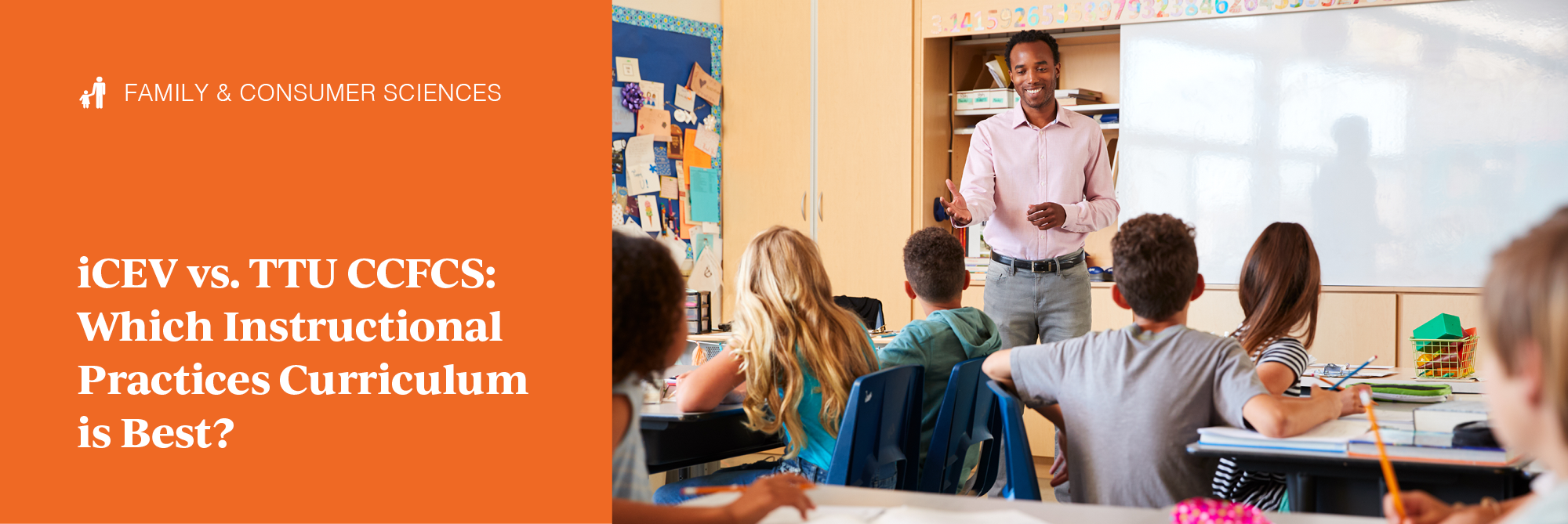High School | Family & Consumer Sciences | Education & Training
iCEV vs TTU CCFCS: Which Instructional Practices Curriculum is Best?
McKenna Garrison joined the iCEV marketing team in 2022 as the Content Marketing Specialist. Originally from a small town on the Gulf of Mexico, Garrison attended Texas Tech University from which she graduated with a B.A. in Public Relations & Strategic Community and an M.A. in Mass Communication & Media Studies. Garrison looks forward to bringing more of a storytelling element to iCEV social media pages. She also hopes to connect other CTE educators from around the country to the incredible curricula and resources iCEV has to offer.
Suppose you’re considering a new curriculum for your Instructional Practices course in your high school Family and Consumer Science program. In that case, you may wonder if Texas Tech University Curriculum Center for Family and Consumer Sciences (TTU CCFCS) or iCEV would be a better fit for your students.
While both are great resources, one may be a better option for your classroom than the other.
In this article, we’ll explore the main similarities and differences between TTU CCFCS and iCEV. Specifically, you’ll learn about:
- The topics each covers
- The instructional format of each curriculum
- The intended audience of each curriculum
- How much each curriculum cost
By the end, you’ll have a better idea of what each provider offers to decide what is the best option for your program.
What Topics Does Each Provider Cover?
Knowing the topics that a course covers is a great place to start in your search for the best Instructional Practices curriculum for your students. In this section, you’ll discover what each provider offers and what implementing their curriculum might look like for your classroom.
What Topics Does iCEV Cover?
iCEV offers ready-to-teach, standards-aligned curriculum for over 20 Family and Consumer Science courses. Each course, including the Instructional Practices course, is designed with both students and educators in mind.
iCEV’s Instructional Practices course covers topics including:
- Teaching & Training Career Preparation
- Creating a Successful Learning Environment
- Professional & Ethical Conduct in Education & Training
- Instructional Technology
- Field Experience in Education & Training Portfolio Capstone
- Educator Self-Care
- Learning Styles
- Developing & Implementing Effective Instruction
- Diversity in the Classroom
- Education & Training Systems
- Role of Stakeholders in Education & Training
- Educational Assessments
- Understanding Special Education
iCEV’s Instructional Practices course can prepare students for a career in education, helping them gain valuable knowledge over topics like leadership, learning styles and how to create a successful learning environment for others.
What Topics Does TTU CCFCS Cover?
While TTU CCFCS does not provide a detailed overview of their course, your students can still expect to build extensive knowledge and skills in Instructional Practices with the provided field-based activities.
With this curriculum, students learn to plan and direct individualized instruction and group activities, prepare instructional materials, develop materials for educational environments, assist with record keeping, and complete other responsibilities of teachers, trainers, paraprofessionals, or other educational personnel.
What Is the Instructional Format of Each Curriculum?
The next factor to consider when choosing a curriculum is its instructional format. After all, some curriculum options may be designed with specific teaching styles in mind, and you’ll want to choose the option that supports you and your students.
This section explores the instructional formats of TTU CCFCS’s curriculum and iCEV’s Instructional Practices course.
What Is the Instructional Format of iCEV’s Instructional Practices Curriculum?
As a comprehensive curriculum solution, iCEV’s Instructional Practices course provides both structure and flexibility for teachers and students while exploring educational concepts and skills.
Within the course, you’ll discover everything you need to start teaching right away, including flexible, pre-made lesson plans, engaging activities, and a wide variety of other materials to give your students plenty of opportunities to learn and grow.
Materials you’ll find in an iCEV course include:
- Lesson plans providing step-by-step guidance for instructors.
- Digital lessons divided into video-based lessons and presentation-based lessons. These are intended to be shown at the front of the class for students to watch and take notes on.
- Video-based lessons include slideshows, interviews with subject matter experts, example scenarios, and skill demonstrations.
- Presentation-based lessons include PowerPoint slides and other such blocks of information students can reference for information.
- Projects and activities designed to increase information retention.
- Formative Assessments to assess student understanding throughout a unit.
- Summative assessments to assess student understanding at the end of a unit.
As a high-quality curriculum solution, iCEV's materials work for any type of learning environment including in-person, virtual, and hybrid classrooms.
What Is the Instructional Format of TTU CCFCS’s Instructional Practices Curriculum?
TTU CCFCS’s Instructional Practices curriculum is a field-based internship that provides students with background knowledge of child and adolescent development and principles of effective teaching.
Students work under the supervision of teachers and educators or trainers in direct instructional roles with elementary, middle, and high school-aged students.
Additionally, through Blackboard, educators are provided with some slide presentations and course outlines to help facilitate learning in combination with the students’ field-based activities to gain a well-rounded knowledge base of best Instructional Practices.
Who Is the Intended Audience of Each Curriculum Option?
Every curriculum option is unique in design and intended audience. In your search for the best Instructional Practices curriculum solution for your students, it’s essential to remember who the curriculum is designed for. Knowing this will help you better meet your students’ needs and your instructional goals.
Who Is the Intended Audience of iCEV’s Instructional Practices Curriculum?
iCEV offers single-subscription access to its comprehensive, standards-aligned Instructional Practices curriculum, designed for grades 9-12.
For teachers looking for a curriculum solution that offers pre-built lesson plans, engaging multimedia-based lessons, customizable activities, hands-on projects, and assessments, iCEV’s Instructional Practices course could be a good choice for your students.
On the other hand, if you’re looking for a supplemental resource and don't see yourself utilizing the added features that come with iCEV, this might not be the best choice for you.
Who Is the Intended Audience of TTU CCFCS’s Instructional Practices Curriculum?
TTU CCFCS’s curriculum is a good choice for teachers looking for supplemental student coursework to implement alongside a more robust curriculum option.
For example, if your Family and Consumer Science program is already implementing a textbook and you’re looking for various activities or projects to beef up your current offerings, this course could be what you’re looking for.
On the other hand, if you’re looking for a comprehensive Instructional Practices curriculum with a wide variety of materials, this course may not be the best fit for your classroom.
While the course does offer multiple projects and activities for students, it is lacking in educational resources like multimedia content and in-depth slide presentations. Without enough variety in your resources, you may be unable to give every student the best opportunity to learn and grow in your classroom.
How Much Does Each Curriculum Cost?
Cost is a substantial factor you must weigh when choosing the best personal finance curriculum for your classroom. In this section, you’ll learn the different pricing options for both curriculum providers and what factors influence their costs.
How Much Does iCEV’s Instructional Practices Curriculum Cost?
The cost of an iCEV subscription depends on a few factors, including which subject area you teach and the number of students needing access.
For example, purchasing iCEV’s Family and Consumer Sciences course curriculum starts at $1,500. With your single subscription, you're able to access 22 comprehensive high school family and consumer science courses, including Instructional Practices, and a wide range of curriculum resources.
However, to get the most accurate pricing information for your classroom, request a quote to quickly gain an even better idea of what implementing this curriculum will look like.
Is funding a challenge standing between your students and high-quality learning experiences? Explore alternative funding sources to determine if there are additional funding sources you can use in your classroom.
How Much Does TTU CCFCS’s Instructional Practices Curriculum Cost?
The TTU CCFCS offers memberships for 12 months. A membership allows you access to online courses, community networking, and professional development.
Memberships start at $200 for one teacher license with access to one curriculum. You can also add additional curriculum for $150 or bundle eight curricula for $800.
Which Instructional Practices Curriculum is Best For My Students?
As an educator, you understand finding the best Instructional Practices curriculum for your students can be challenging. There are a lot of factors to consider, from choosing materials that are well-formatted and engaging to ensuring your students are the intended audience.
If you’re an educator looking for supplemental student coursework to implement alongside a more robust curriculum, TTU CCFC’s Instructional Practices curriculum might be a good choice for your Family and Consumer Science program.
But if you're looking for a comprehensive Instructional Practices curriculum to meet your standards and set your students up for success, consider iCEV.
If iCEV sounds like it could be right for you, sign up for a free trial. You'll receive full curriculum access so you can decide if it's a good fit for your Family and Consumer Science program.


